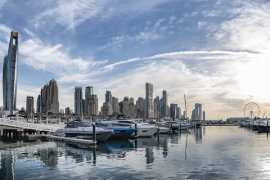Working towards an energy-efficient future
By admin Wednesday, 11 February 2015 2:45 PM

The World Future Energy Summit (WFES) is the Middle East’s largest gathering on future energy and one that drives actionable solutions to the world’s energy challenges. Now in its eighth edition, WFES 2015 was held in Abu Dhabi at ADNEC from 19 – 22 Jan 2015, and attracted upwards of 30,000 delegates from 170 different countries, representing expertise from industry, technology, finance and government. A report
His Highness Sheikh Mohammed bin Rashid Al Maktoum, Vice-President and Prime Minister of the UAE and Ruler of Dubai, and General Sheikh Mohamed bin Zayed Al Nahyan, Crown Prince of Abu Dhabi and Deputy Supreme Commander of the UAE Armed Forces, attended the opening of the eighth annual session of the World Future Energy Summit, as part of Abu Dhabi Sustainability Week, in the presence of Egyptian President, Abdul Fattah El Sisi.
The opening of the summit was also attended by a number of presidents and representatives of a number of sisterly and friendly countries, a host of leading personalities, experts and scholars, and those with interest in the energy sector from around the world.
General Sheikh Mohamed bin Zayed Al Nahyan confirmed that under the leadership the President His Highness Sheikh Khalifa bin Zayed Al Nahyan, the UAE has become a centre of gravity for the encouragement and incubation of innovation for those who seek to find solutions to the world’s most pressing challenges.
Sheikh Mohamed bin Zayed made his remarks during the seventh Zayed Future Energy Prize awards ceremony, part of the current Abu Dhabi Sustainability Week 2015.
During the ceremony, Sheikh Mohamed bin Zayed, Sheikh Mohammed bin Rashid and Egyptian President, Abdel Fattah El Sisi honoured the winners of the prize.
Sheikh Mohamed bin Zayed also emphasised the importance of moving forward in the modernisation and development efforts with a commitment to the principles of sustainable development – noting the importance of focusing on energy other vital resources such as food and water that are considered the spinal cord of all human development.
"It all starts with an idea – and our bid to honour and continue the legacy of Sheikh Zayed bin Sultan Al Nahyan – who advocated for education and the development of human resources throughout his lifetime. We aim to encourage the bright minds and the innovators to find practical solutions for our world’s challenges; in a path towards a better future built on the pillars and foundations of sustainability.
Gen. Mohamed emphasised on the importance of catalysing the international and multilateral action towards promoting energy and water security, sustainable development and improving the social and economic sustainability mankind.
He congratulated the winners of the 2015 Zayed Future Energy Prize, who have opened up new horizons to innovation in clean energy and sustainability with a unique vision that is reflective of the principles and foundations set forth by the founding father of the UAE."
WFES was held under the patronage of His Highness Sheikh Mohammed Bin Zayed Al Nahyan, Crown Prince of Abu Dhabi and Deputy Supreme Commander of the UAE Armed Forces, WFES catalyzed partnerships through the Project and Finance Village, TechTalk, and the Sustainability Business Connect Program, where leading companies representing the entire energy spectrum – from hyrocarbons to renewables – will gather to showcase innovations and share best practices.
One of the world’s most vocal campaigners on climate change, Mr Gore was vice president under Bill Clinton and was behind the Oscar-winning climate change documentary An Inconvenient Truth, released in 2006. A year later he was awarded the Nobel Peace Prize jointly with the Intergovernmental Panel on Climate Change.
Mr Gore was optimistic about a global agreement to reduce greenhouse gases at a conference in Paris at the end of the year, and about humanity’s overall ability to deal with the issue.
“The younger generation particularly, but people of all ages, are now really coming into a full awareness of the fact that we have to change,” he said.
“There really is only one other question beyond that one: ‘Can we change?’ … and the answer to that is provided by the people who are up here on this stage,” he said, pointing to the other award winners.
“Those of us who are privileged to be alive during this extraordinary period of time have the opportunity to make an impact on the future of human civilisation, to affect what fraction of the species with which we share this planet will survive this extinction spasm that is brought about by the activities that now need to be changed.”
One of the world’s most vocal campaigners on climate change, Mr Gore was vice president under Bill Clinton and was behind the Oscar-winning climate change documentary An Inconvenient Truth, released in 2006. A year later he was awarded the Nobel Peace Prize jointly with the Intergovernmental Panel on Climate Change.
Mr Gore was optimistic about a global agreement to reduce greenhouse gases at a conference in Paris at the end of the year, and about humanity’s overall ability to deal with the issue.
“The younger generation particularly, but people of all ages, are now really coming into a full awareness of the fact that we have to change,” he said.
“There really is only one other question beyond that one: ‘Can we change?’ … and the answer to that is provided by the people who are up here on this stage,” he said, pointing to the other award winners.
“Those of us who are privileged to be alive during this extraordinary period of time have the opportunity to make an impact on the future of human civilisation, to affect what fraction of the species with which we share this planet will survive this extinction spasm that is brought about by the activities that now need to be changed.”
One of the world’s most vocal campaigners on climate change, Mr Gore was vice president under Bill Clinton and was behind the Oscar-winning climate change documentary An Inconvenient Truth, released in 2006. A year later he was awarded the Nobel Peace Prize jointly with the Intergovernmental Panel on Climate Change.
Mr Gore was optimistic about a global agreement to reduce greenhouse gases at a conference in Paris at the end of the year, and about humanity’s overall ability to deal with the issue.
“The younger generation particularly, but people of all ages, are now really coming into a full awareness of the fact that we have to change,” he said.
“There really is only one other question beyond that one: ‘Can we change?’ … and the answer to that is provided by the people who are up here on this stage,” he said, pointing to the other award winners.
WFES is the anchoring event of the Masdar-hosted Abu Dhabi Sustainability Week (ADSW), taking place from January 17 – 24 that includes the third International Water Summit (IWS), the second edition of EcoWASTE, and the Zayed Future Energy Prize. The week also coincided with the Fifth General Assembly of the International Renewable Energy Agency (IRENA).
As an international conference and business platform that stays at the forefront of the world’s energy conversation, WFES 2015 provides energy stakeholders with unparalleled opportunities to meet with their peers, exchange technology, and make deals that promote a better energy future.
In its 7th year, the prize awarded 9 winners for their outstanding achievements in advancing renewable energy and sustainability worldwide. The winners across four of the five categories are Panasonic for the Large Corporation, M-KOPA Solar for the SME category, Litre of Light in the NPO category as well as former U.S. Vice President Al Gore for his lifetime of achievements, and five high schools from around the world.
The annual $4 million prize, established by the UAE, recognises companies, organisations, schools and individuals across the world that have made significant contributions to the future of renewable energy and sustainability.
Speaking at the opening ceremony of Abu Dhabi Sustainability Week, Dr. Sultan Ahmed Al Jaber, Director-General of the Zayed Future Energy Prize, thanked General Sheikh Mohammad bin Zayed al Nahyan for his enduring support and leadership which he referred to as the "driving force behind the Prize’s success."
He added, "Our leadership established this prize in honour of the legacy and teachings of our late founding father, Sheikh Zayed bin Sultan Al Nahyan, God Rest his Soul, who laid the foundations for the importance of sustainable development. The UAE continues on this path through the wise leadership of the President of the United Arab Emirates His Highness Sheikh Khalifa bin Zayed Al Nahyan by building bridges of collaboration with the international community in order to face the challenges facing the world today."
He added that the Zayed Future Energy Prize re-affirms the UAE’s commitment towards supporting, developing and deploying renewable energy and sustainability solutions in the UAE and around the world; highlighting that addressing climate change is a shared responsibility and will require a large amount of continuous collaboration between governments, institutions and individuals to take action. He emphasised that success will only be achieved through innovation and unique action that will leave a lasting positive imprint on the world.
Since 2009, the Zayed Future Energy Prize ambassadors have positively impacted the lives of over 150 million people - delivering clean drinking water, electrifying rural areas, educating the next generation and creating hundreds of sustainable jobs.
Olafur Ragnar Grimsson, President of the Republic of Iceland and chair of the Zayed Future Energy Prize Jury, said, "The social inclusivity of the Prize allows even the next generation to play a role in delivering a sustainable future. By funding clean energy projects in schools, the Prize sets the tone for another generation of energy leaders who will continue its great work around the world."
The Global High Schools category – now in its third year – was launched to recognise and encourage young people to incorporate renewable energy and sustainability into their schools.
Five schools, from five global regions, each received $100,000 to fund their proposed sustainability projects. The winners are: Munro Academy from the Americas region; Petru Rare National College representing Europe; Waterford Kamhlaba United World College of Southern Africa (UWCSA) from Swaziland and representing Africa, Addu High School in the Republic of the Maldives for the Asia region; and Melbourne High School in Australia representing Oceania.
Finalists of the 2015 Zayed Future Energy Prize were later awarded at a special ceremony by Dr. Sultan Al Jaber and His Excellency Olafur Ragnar Grimsson, president of the Republic of Iceland with a certificate of participation.
Panasonic, the multinational electronics manufacturer, won recognition in the Large Corporation category for a long-standing commitment to social, economic, and environmental sustainability throughout the company’s operations. The company is best known in renewable energy as the perennial world record holder for solar PV cell efficiency and expanding the market opportunity for solar worldwide.
In the SME category, M-KOPA Solar was awarded $1.5 million for its innovative approach to deploying solar electricity to rural villages in Kenya and Uganda, delivering access to affordable energy to rural communities that need it most. To date, the company has sold more than 100,000 solar home systems.
Social enterprise, Liter of Light was awarded $1.5 million in the NPO category. Using recycled plastic bottles, water and bleach to create solar lanterns, the small volunteer group, established as part of the relief efforts during the aftermath of Typhoon Haiyan, has expanded to 15 countries, and has installed lanterns in more than 350,000 homes.
Former US Vice President Al Gore is the fourth recipient of the Zayed Future Energy Prize Lifetime Achievement award. Gore was recognised for his unwavering personal and political commitment to raise international awareness about the dangers of climate change, while reinforcing optimism that the global community can successfully tackle the challenge.
Al Gore gives optimistic speech in Abu Dhabi
“Those of us who are privileged to be alive during this extraordinary period of time have the opportunity to make an impact on the future of human civilisation, to affect what fraction of the species with which we share this planet will survive this extinction spasm that is brought about by the activities that now need to be changed.”
One of the world’s most vocal campaigners on climate change, Mr Gore was vice president under Bill Clinton and was behind the Oscar-winning climate change documentary An Inconvenient Truth, released in 2006. A year later he was awarded the Nobel Peace Prize jointly with the Intergovernmental Panel on Climate Change.
Mr Gore was optimistic about a global agreement to reduce greenhouse gases at a conference in Paris at the end of the year, and about humanity’s overall ability to deal with the issue.
“The younger generation particularly, but people of all ages, are now really coming into a full awareness of the fact that we have to change,” he said.
“There really is only one other question beyond that one: ‘Can we change?’ … and the answer to that is provided by the people who are up here on this stage,” he said, pointing to the other award winners.
The company will use the prize money, $1.5 million, to build a training academy for staff and sales agents so that it can grow faster, reaching more users.
The Future Energy Prize has an award fund of US$4 million, nearly Dh15m. Mr Gore received $500,000 for his lifetime achievement award.
Other winners included Japan’s Panasonic Corporation, which was first in the large corporation category, and Liter of Light, a non-profit organisation that provides free solar-powered light to homes in impoverished communities.
The prize also recognised the efforts of five high schools – Addu High School in the Maldives, Australia’s Melbourne Girls’ College in Australia, the Waterford Kamhlaba in Swaziland, Munro Academy in Canada and Petru Rares National College in Romania – which all received $100,000 each.
Launched and managed by the Abu Dhabi clean energy company, Masdar, the award honours the late founding father and President, Sheikh Zayed. It is part of Abu Dhabi Sustainability Week, which continued until January 22.The company will use the prize money, $1.5 million, to build a training academy for staff and sales agents so that it can grow faster, reaching more users.
The Future Energy Prize has an award fund of US$4 million, nearly Dh15m. Mr Gore received $500,000 for his lifetime achievement award.
Other winners included Japan’s Panasonic Corporation, which was first in the large corporation category, and Liter of Light, a non-profit organisation that provides free solar-powered light to homes in impoverished communities.
The prize also recognised the efforts of five high schools – Addu High School in the Maldives, Australia’s Melbourne Girls’ College in Australia, the Waterford Kamhlaba in Swaziland, Munro Academy in Canada and Petru Rares National College in Romania – which all received $100,000 each.
Launched and managed by the Abu Dhabi clean energy company, Masdar, the award honours the late founding father and President, Sheikh Zayed. It is part of Abu Dhabi Sustainability Week, which continues until January 22.
Among them was Jesse Moore, managing director of M-Kopa Solar, a Kenyan company that enables people in Africa to use electricity derived from solar power, while eliminating high upfront infrastructure costs. Users instead pay a daily rate via mobile phones.
Mr Moore’s company won the small and medium enterprise category of the award.
“Those of us who are privileged to be alive during this extraordinary period of time have the opportunity to make an impact on the future of human civilisation, to affect what fraction of the species with which we share this planet will survive this extinction spasm that is brought about by the activities that now need to be changed.”




























Add new comment